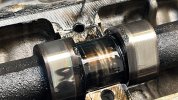After doing some reading last night (god, how my Saturday nights have changed!) it looks likely that I'll be pulling the cylinder head off. I did find the borescope though so I'm going to have a poke around with that and see what I can see first.
If I can't rotate the crank is there anything I can do about the timing? Do I just have to accept that the timing will all be lost and have to set it all up again when I reassemble the engine? Or would I have had to do that anyway if I was removing the head? Do I need any special kit for setting up the timing or can it all be done from alignment holes and witness marks etc?
If I can't rotate the crank is there anything I can do about the timing? Do I just have to accept that the timing will all be lost and have to set it all up again when I reassemble the engine? Or would I have had to do that anyway if I was removing the head? Do I need any special kit for setting up the timing or can it all be done from alignment holes and witness marks etc?


